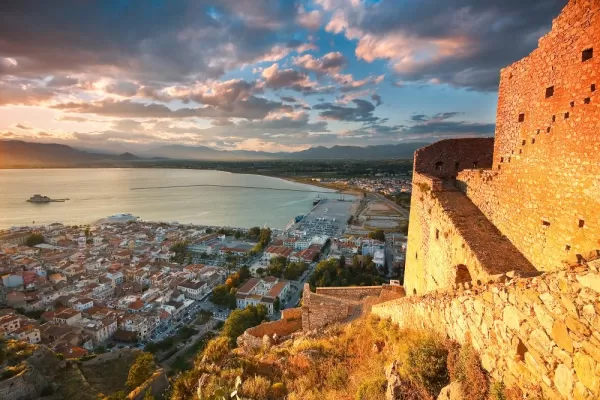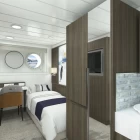After breakfast, enjoy a morning ‘Your Choice’ experience. Walk in Socrates' footsteps, explore the ancient wonders of the Acropolis, or immerse yourself in Athens' vibrant food scene with a local guide. You can then rejoin the coach to return to your hotel or take a leisurely stroll to the nearby Plaka district. This charming area is filled with streets and alleys lined with restaurants, cafes, and shops—ideal for a bite to eat or picking up gifts (lunch at your own expense). Tonight, kick off your journey with a Welcome Event, celebrating Greek style.
With a rich recorded history spanning 3,500 years, Athens is a city brimming with stories. Widely hailed as the ‘cradle of civilization’ and revered as the birthplace of democracy, philosophy, and theater, Athens seamlessly merges its illustrious past with its vibrant present. This bustling metropolis, home to three million inhabitants, is adorned with a wealth of ancient sites that punctuate its landscape, like temples, iconic columns, and former city centers. Athens’ influence in antiquity transcended its borders, ushering in a Golden Age characterized by political discussion, education, and philosophy, hosting luminaries such as Socrates, Plato, and Aristotle. The democratic principles forged in Athens laid the groundwork for modern governance systems worldwide.
Yet Athens is more than just a relic of ancient history. As a historical seat of power, it has weathered waves of invasions, shaping its contemporary identity with a diverse fusion of architectural styles, culinary delights, and cultural traditions. Whether you are wandering amid ancient ruins or indulging in the flavors of modern Greek cuisine, Athens offers a captivating journey through the ages, beckoning travelers from across the globe to explore its timeless allure.
Personalize your exploration with the included ‘Your Choice’ experiences.
Option 1 – Morning Experience: A Taste of Athens
For foodie fans, travelers who have visited Athens before, and those who enjoy a personal view of Athens, this experience is perfect. The guided walk starts at Syntagma Square, where Greece’s Parliament building stands, guarded by traditionally attired Evzone guards. The local expert warmly welcomes you to their home city, leading you on an intriguing walking tour through Athens’ historical areas. With passion and knowledge, they unveil authentic Athens and its secrets.
Stroll through Plaka, the charming ‘old quarter’ of Athens nestled at the base of the Acropolis. Admire its eclectic neoclassical architecture, picturesque alleys, and inviting tavernas. Pause at a colorful local cafe to indulge in Greek delicacies such as olives, fragrant cheeses, and cured meats.
Continue through Monastir Aki, famous for its bustling flea market and vibrant shops brimming with local crafts and souvenirs. From there, you wander to Thission, offering the best panoramic views of the Acropolis, Ancient Agora, and the majestic Temple of Hephaestus. Here, you treat yourself to a traditional Greek coffee, accompanied perhaps by a sweet delight like baklava, a favorite among Greeks for its rich layers of pastry, nuts, and honey. This morning offers you a taste of this fascinating city.
Option 2 – Morning Experience: Ancient Athens
This comprehensive tour combines a visit to the Acropolis with the city’s major landmarks. Begin with a view of the Greek parliament at Syntagma Square, once a royal residence, where the iconic Evzones still stand guard in traditional attire. Next, enjoy a brief photo stop at the Panathenaic Stadium, the site of the first modern Olympic Games in 1896, where athletes revived the ancient Olympic spirit.
Perched high above the city, the Acropolis is not only an architectural marvel but also a symbol of the birthplace of democracy. This ancient citadel stands as a testament to the enduring legacy of Greek culture and ideals, representing advancements in art, architecture, and political thought that originated in Athens. Feel the essence of civic pride and religious devotion in ancient Greek society at the city’s center for political and cultural life. The Parthenon exemplifies the height of classical Greek architecture, adorned with doric columns and intricate sculptures. Built under the leadership of Pericles, the Parthenon symbolized the city’s wealth and power, with friezes and statues depicting various mythological scenes.
After touring the Acropolis, take a short walk to the Acropolis Museum. This modern museum houses over 3,000 artifacts from the Athenian Acropolis, offering unique insights into ancient Greek life and including an archaeological excavation beneath it. (Note: Entrance time to the Acropolis is a local government stipulated time slot. The sequence of the above itinerary may change once the specific time slot is allocated.)
Option 3 – Morning experience: ‘In the Sandal prints of Socrates’
Blending philosophy with the rich history of Athens', ‘In the Sandals of Socrates’ is the ultimate walking tour of the city. Your journey begins at the hilltop agora, where Athenians once gathered to freely express their opinions and debate issues of the day. Ancient Greece birthed Western philosophical ethics, thanks to Socrates, Plato, and Aristotle, ensuring its place in history. Next, head to Philopappos Hill, a significant place in the life of Socrates. Here, you’ll find the prison where he was held for corrupting the youth of Athens and the Pnyx, the birthplace of democratic ideals. The view of the Acropolis from the hilltop is stunning.
Strolling down a pedestrian street lined with cafes and vendors, make your way to Hadrian’s Arch and the Temple of Olympian Zeus. Your walk continues to the Lyceum, Aristotle’s school, passing by the National Garden and Zappeion Hall. The tour concludes at the Lyceum, excavated and opened to the public in 2014. Here, you walk in the footsteps of great philosophers, linking ancient and modern Athens in this fascinating journey.
Accommodation: Athens Hotel
Meals: Welcome Event canapés



































